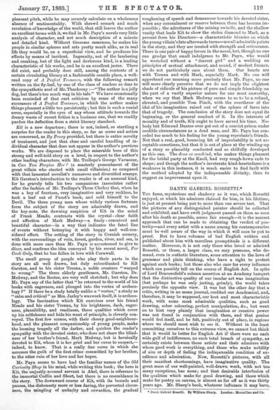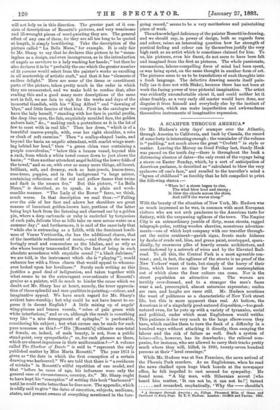DANTE GABRIEL ROSSETTL* THE fame, mysterious and shadowy as it
was, which Rossetti enjoyed, or which his admirers claimed for him, in his lifetime, is just at present being put to more than one severe test. That the pictures of any distinguished painter should be collected_ and exhibited, and have swift judgment passed on them as soon after his death as possible, seems fair enough—it is the nearest approach that can be made to obtaining the verdict of pos- terity—and every artist with a name among his contemporaries must be well aware of the way in which it will soon be put to proof. But to have volumes of bad English written and published about him with merciless promptitude is a different matter. Moreover, it is not only those who loved or admired Rossetti, or those, a larger class, we may presume, who de- mand, even in msthetic literature, some attention to the laws of grammar and plain thinking, who have a right to protest against such books ; but those also who care for every influence which can possibly tell on the course of English Art. In spite of Lord Beaconsfield's solemn assertion at an Academy banquet that the distinctive quality of our insular art was imagination (but perhaps he was only jesting, grimly), the world takes precisely the opposite view. It was but the other day that a critic, writing in no mean journal, credited our Academical, and, therefore, it may be supposed, our best and most characteristic work, with some most admirable qualities, such as good drawing, sober colouring, perfect manipulation, &a., but went on to hint very plainly that imagination or creative power was not found in conjunction with them, and that genius would feel itself, and be felt, positively out of place, in regions where we should most wish to see it. Without in the least committing ourselves to this extreme view, we cannot but think that it would be better for English Art if there were no such wide gulf of indifference, no such total breach of sympathy, as certainly exists between those artists and their admirers with whom good work is everything, and those who make nobility of aim or depth of feeling the indispensable condition of ex- cellence and admiration. Now, Rossetti's pictures, with all their manifest shortcomings, have imaginative quality. The great mass of our well-painted, well-drawn work, with not too. many exceptions, has none; and that desirable interfusion of the qualities which make for good drawing, and, those which make for poetry on canvas, is almost as far off as it was thirty years ago. Mr. Sharp's book, whatever influence it may have,.
• Dante Gabriel Rossetti. By William Sharp. London : Macmillan and Co. -will not help us in this direction. The greater part of it con- ants of of descriptions of Rossetti's pictures, and very wearisome and ill-wrought pieces of word-painting they are. The general effect of any one of them, for they are all too long to be quoted at length, is simply bewildering. Tale the description of the picture called " La Bella Matto," for example. It is only fair to Mr. Sharp to say that he declares this picture to be "mean- ingless as a design, and even incongruous, as in the introduction of angels as servitors to a lady washing her bands;" but then he also declares it to be "probably the one which the greater number of fit persons would select from the painter's works as excelling in all mastership of artistic craft," and that it has "elements of endless delight." Here are some of the items or constituent parts of the picture, taken pretty much in the order in which they are enumerated, and we make bold to confess that, after reading this and a good many more descriptions of the same sort in full, we are fain to sigh for the works and days of the immortal Gandish, with his "King Alfred" and "dawning of 'Ope," and little fancies of that kind. First in the catalogue we have the lady herself, "standing with her face in partial profile, the deep blue eyes, the fair, exquisitely moulded face, the golden auburn hair," &c., "making such a portraiture as it is the lot of few to meet with in real life." Then her dress, "which is of a beautiful mauve-purple, with, over her right shoulder, a robe or cloak of soft carmine." Then "a scallop-shaped basin, and beyond the basin an angelic attendant, with scarlet wings meet- ing behind her head," then "a green china vase containing a purple convolv-alus," "below this a brazen vessel, beyond this a rack, from which a white towel comes down to just above the basin ; " "then another attendant angel holding the lower folds of the towel," and so on, with ever so many more things, all lucent, brilliant, soft, and dreamy, such as hair-jewels, lemon-trees, rose-trees, poppies, and in the background "a large mirror, containing reflections of the red and yellow flames that twine and flash in the unseen fire." Bat this picture, "La Bella Mano," is described, so to speak, in a plain and work- manlike manner. "The Lady of the Bower" fares, we think, much worse. In that description we read thus :—" Falling over the side of her face and adown her shoulders are great masses of luxuriant golden-brown hair, portions of the latter being kept back from the listening and charmed ear by a golden pin, where a deep carbuncle or ruby is encircled by turquoises of such pale, delicate blue as hills take on seen across water on a summer day ;" and furthermore, it is said of the same lady that "while she is entrancing as a Lilith, with the dominant loveli- ness of Venus Verticordia, she has the additional charm, that of the inevitable refinement of music,—and though she were as lovingly cruel and remorseless as the Idaliau, and as wily as she whose beauty transcended Eve's, the fact of being in such absolute accordance with exquisite sound [" a black dulcimer,' we are told, is the instrument which she is " playing "], would enhance her with a Siren charm that would appeal to whomso- ever looked upon her loveliness." Surely such writing as this justifies a good deal of indignation, and taken together with what seems to us the extravagant over-estimate of Rossetti's genius as a painter, will do much to hinder the cause which we doubt not Mr. Sharp has at heart, namely, the truer apprecia- tion of those splendid and rare qualities in painting,—colour, and imaginative appeal. We have much regard for Mr. Sharp's evident hero-worship; but why could he not have learnt to ex- press it in decent English ? A little mixing up of angels' wing-plumes and brazen vessels, "robes of pale green with white interfusions," and so on, although the result is something -very like "a nice derangement of epitaphs," is pardonable, considering his subject; but what excuse can be made for such pure nonsense as this ?—" His [Rossetti's] ultimate sum-total of female, or, indeed, of male beauty, is not, from a public stand-point, very sympathetic ;" or, for such phrases as these, which are almost ingenious in their malformation ?—" A volume -called The Shadow of Dante" is said to "represent the only published matter by Miss Maria Rossetti." The year 1851 is given as "the date in which the first conception of a certain drawing was harboured." We are told that there is "a residuum of mistake" in Rossetti's wilful repetition of one model, and -that "before he came of age, his influences were only the general ones of circumstances, country, &c." Mr. Sharp ought -to have kept his "conception" of writing this book "harboured" until he could write better than he does now. The appendix, which is oddly said to give " the dates of execution, subjects, mediums, states, and present owners of everything mentioned in the fore-
going record," seems to be a very meritorious and painstaking piece of work.
The acknowledged deficiency of the painter Rossetti in drawing, and we should say, in power of design, both as regards form and colour, raises an interesting question how far strength of poetical feeling and colour can by themselves justify the very high rank as an artist which is sometimes claimed for him. To us, his pictures, even his finest, do not seem to have been felt and imagined from the first as pictures. The whole passionate, unconscious, labour-compelling force of mind had been spent, or was being spent, on the same thought in another form of art. The pictures seem to us to be translations of such thoughts into a fresh language. The defective drawing asserts itself pain- fully (as it does not with Blake), because there has not been at work the fusing power of true pictorial imagination. The artist was evidently uncomfortable about it, and could neither let it alone frankly, as a very early old master would have done, nor disguise it from himself and everybody else by the instinct of composition, which can make imperfection and awkwardness themselves instruments of imaginative expression.







































 Previous page
Previous page